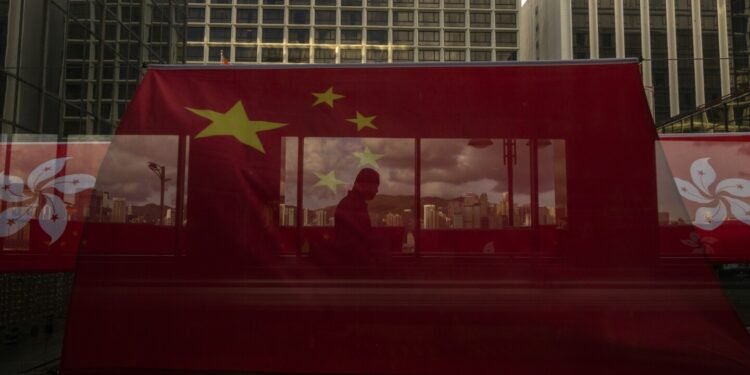HONG KONG (news agencies) — As Hong Kong moves toward enacting a new national security law, four years after Beijing imposed a similar law that all but wiped out dissent and vocal pro-democracy media in the semi-autonomous Chinese city, concerns are spreading among the city’s international business and media communities.
Critics say the legislation will make Hong Kong’s legal system increasingly similar to that of mainland China, but the government argues it will affect only a “small minority” of disloyal residents.
Businesses and journalists fear that broad provisions on state secrets could criminalize their day to day work.
The Basic Law, the city’s mini-constitution, requires it to pass a home-grown national security law. But previous efforts to pass such a law were defeated by a massive protest that saw them as efforts to erode the civil liberties Beijing promised to keep intact in the former British colony for 50 years after it returned to Chinese rule in 1997.
However, following a year of massive pro-democracy protest that rocked the city in 2019, China’s rulers took harsh measures to impose control.
Under Beijing’s 2020 National Security Law, many of the city’s leading activists were arrested and others fled abroad. Several vocal media outlets were shuttered. Large protests have been absent in the city in the post-pandemic era.
That law targeted politically active Hongkongers, but businesses and journalists are worried that the local law could bring more mainland-style surveillance and censorship to Hong Kong.
The city’s many companies are concerned about how the new law could affect handling economic data or exclusive research, said George Chen, Hong Kong-based managing director for American policy consulting firm The Asia Group.
A public consultation document proposed criminal prosecution for unlawfully disclosing state secrets, echoing the broad definition of secrets used in mainland China, which covers economic, social and technological developments among other areas.
Last year, Chinese authorities raided the offices of consulting firm Capvision and corporate due diligence firm Mintz Group in mainland China as part of an ongoing crackdown on foreign businesses that handle sensitive economic data. An employee of a Japanese drug maker was also detained on spying charges.
In response to questions from media, the government said in an email that the legislation targets “an extremely small minority of people who endanger national security,” insisting that normal business people, individuals, organizations and the media sector “will not unwittingly violate the law.”
It added that countries including Britain, the U.S. and Canada also have state secrets laws that cover sensitive information beyond traditional security fields, provided its unauthorized disclosure could jeopardize national security.
It’s not clear when the government will table a bill in the legislature. A one-month public comment period ends Wednesday, and the government has said it intends to pass the law this year. With the legislature packed with Beijing loyalists following an electoral overhaul, it’s expected to pass easily.
Johannes Hack, the president of the German Chamber of Commerce in Hong Kong, told media that the new law could change how people see the city’s status in China. For decades, Beijing allowed the city to maintain rule of law and civil liberties under a policy called “one country, two systems.”
The new definition of state secrets, he said in an email, “may increase the perception that the ‘one country’ aspect of Hong Kong’s special status is more in focus than the “two systems.’”
“For Hong Kong to present a distinctive business advantage vis-a-vis the mainland, the two systems part is however quite important. Hong Kong in our view should be different ‘in fact and feeling,’” Hack said. The costs for businesses to comply with the “quite broad definition” of state secrets may also lead to investment being channeled elsewhere, he added.
The European Chamber of Commerce in Hong Kong said it will study the consultation with great interest, while the American Chamber of Commerce said it was still soliciting members’ views.
Journalists, too, fear the implications of the new law.
A leading group for media professionals, Hong Kong Journalists Association, said in a submission to the government that all members who took part in a survey this month felt the new law would negatively affect press freedom, with 90% saying the effect would be significant.
The association said the broad and vague definition of state secrets would make it challenging for journalists to make sound judgement on what could constitute a threat to national security, and that could deter the press from reporting.



 Pakistan Rupee Exchange Rate
Pakistan Rupee Exchange Rate





